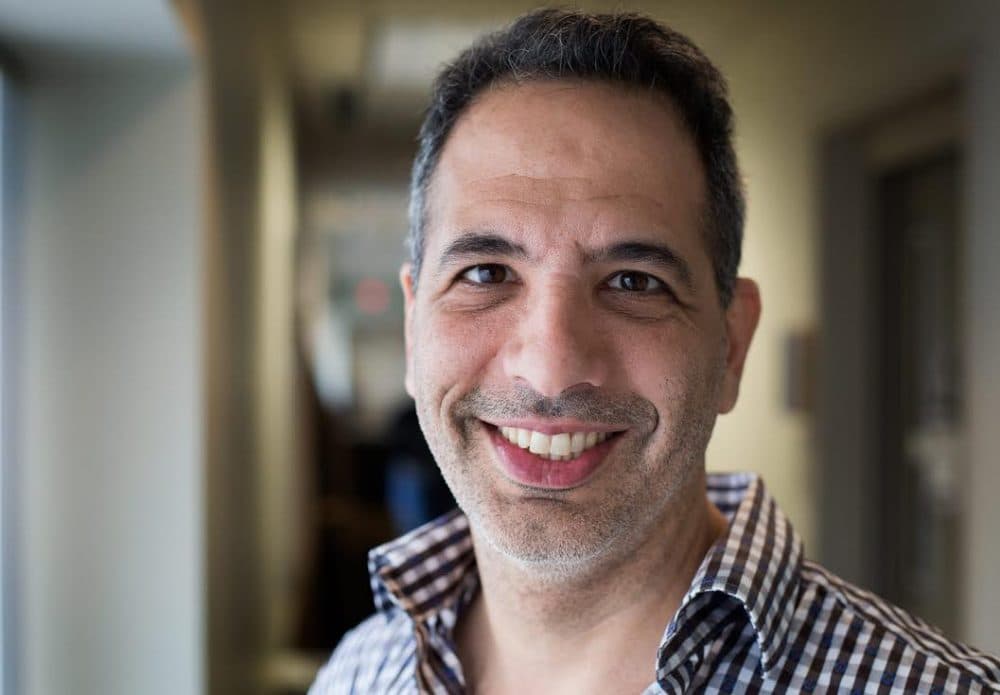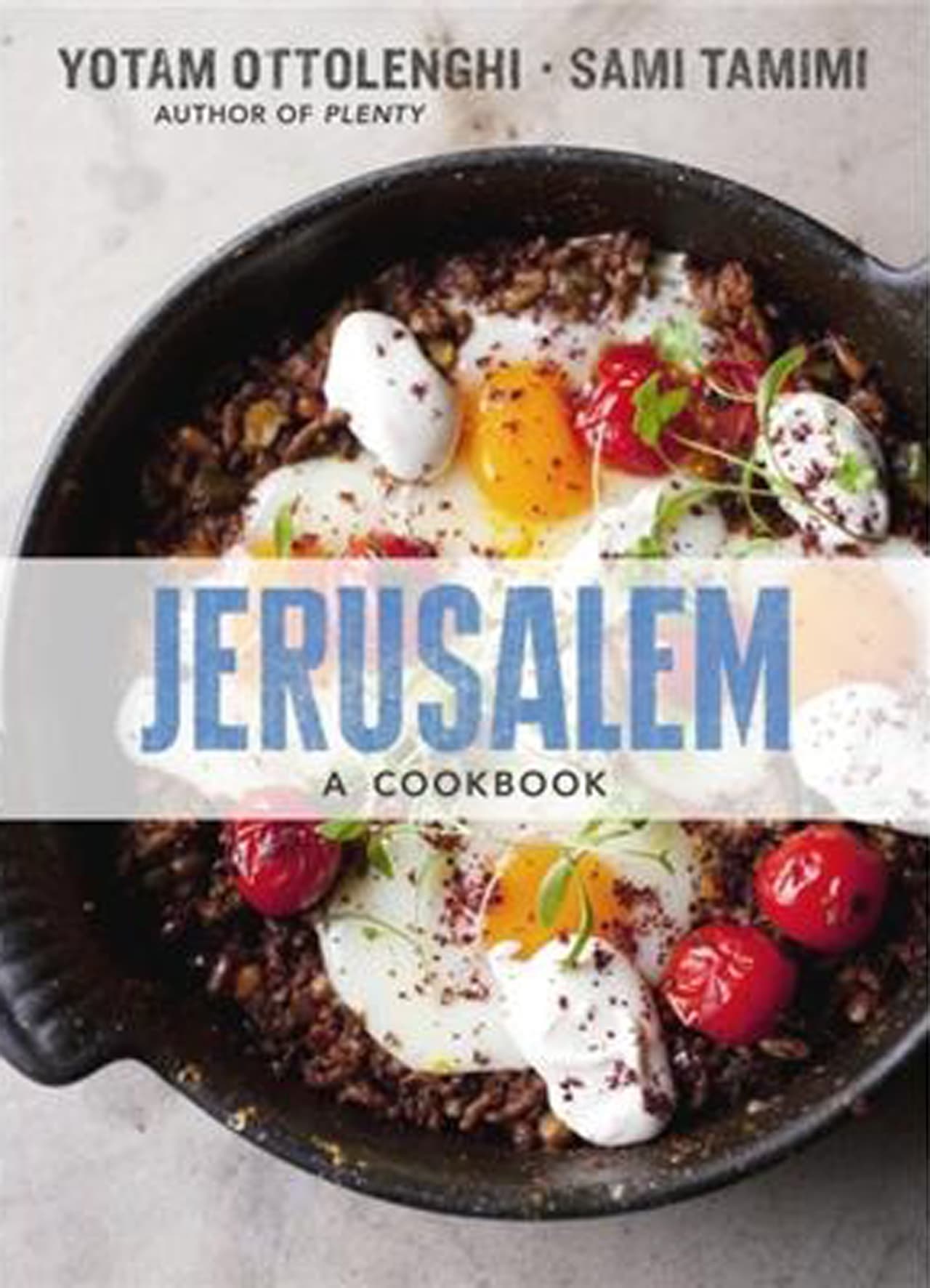Advertisement
Chef Ottolenghi On Food, And Its Role In Israeli-Palestinian Conflict

Jerusalem-born, London-based chef Yotam Ottolenghi is widely acclaimed for his restaurants and the cookbooks "Plenty" and "Jerusalem," which he wrote with Sami Tamimi, who is Palestinian.
Both books are bestsellers, but "Jerusalem" has proved to be a sensation, inspiring what The New York Times' Julia Moskin called "Jerusalem fever."
While in town to receive an honorary degree from Brandeis University, Ottolenghi joined Here & Now's Robin Young in the studio to discuss food and cooking.
Interview Highlights: Yotam Ottolenghi
On his relationship with his co-author and their heritage

"My co-author Sammi Tamimi, who is a Palestinian - I'm an Israeli - the food that we cook, the recipes that we've published have inspired people to cook Mediterranean food, to cook Middle Eastern food, and see us as kind of symbols of collaboration that unfortunately doesn't exist on the ground. So I think, without ever intending for this to happen, it has happened, which is wonderful."
"It's funny because we are not those labels, we're just two people. We're quite similar in many ways and that similarity transcends everything else. We're not political animals. In a sense, we're not really good representatives of our own culture. So it's very easy for us to get on. And we love the same kind of food, we love celebrating food, and eating wonderful things and cooking hummus."
"Jerusalem is a tormented place in many senses. It's a place that is unfortunately in conflict. There are two people living side-by-side and not getting on at all. Now, we - Sam and I - are trying to make the most out of it. So out of the conflict and out of the intensity of the emotions comes some amazing foods."
Advertisement
On the difference between "Plenty" and "Jerusalem"
"In 'Plenty' and in the sequel 'Plenty More,' I put the emphasis on vegetables. It was all about vegetables and how far you can take them and just discovering new ways because people were stuck in their own way somehow with vegetables. They were kind of boiling them to death and doing horrible things... 'Jerusalem' is a different story because it brings in a lot of the Middle Eastern flavors - things like tahini sauce, and preserved lemon and pomegranate molasses."
On the importance of food in the Israeli-Palestinian conflict
"Out of the conflict and out of the intensity of the emotions comes some amazing foods."
"The difficulty is where to start. In the Middle East, there's a small piece of land with two nations fighting over it. Everything is important, including the food. As a result, there's always scramble over ownership: Who invented hummus? Who invented falafel? Who makes it better? Who owns it? Those are really crucial questions when the reality is very shaky and people are really scrambling for identity."
"[Hummus] is definitely an Arab dish, I don't think anyone would deny that, but obviously it became the national dish of Israel as well. So you know, it belongs to everybody now, but it depends on your perspective. It's a very political thing. A Palestinian would say, 'This is our food. This has been colonized.' And an Israeli would say, 'We cook it. We love it. We can share it.' It doesn't necessarily need to be one way or the other, but there's definitely a conflict around that."
On some ingredients Americans may not recognize
"Za'atar, it's a local spice or herb that's dried and mixed with sesame seeds and salt and a couple of other things. It's got a really beautiful savory flavor."
"Freekeh is a wheat. It's just normal wheat, but it's being harvested earlier before it dries, hence it's green and it's got a slightly smokey flavor because it's part of the process - a bit of the wheat is being almost burned or singed."
"In the Middle East, there's a small piece of land with two nations fighting over it. Everything is important, including the food."
"Ras el hanout, it's a spice blend essentially - a north-African spice blend - that actually means 'the top of the shop' which means the best spice that the shop-holder has. It's the best spices put together. So some recipes have 15 spices, some have 25 in them, but essentially there are a lot of sweet spices. Sometimes rose petals are added as well."
On how to cook eggplant
"I like to roast my eggplant in the oven. When you roast your eggplant, essentially what I say is you need to soak them with a lot of olive oil, a lot of salt and pepper and you need to leave them in the hot oven for a very long time, like 25 minutes to a half-an-hour, until they get really nice and brown. The worst thing you can do is under-cook an eggplant."
Guest
- Yotam Ottolenghi, chef and co-author of "Plenty: Vibrant Vegetable Recipes from London's Ottolenghi," and "Jerusalem: A Cookbook." He tweets @ottolenghi.
This segment aired on May 18, 2015.